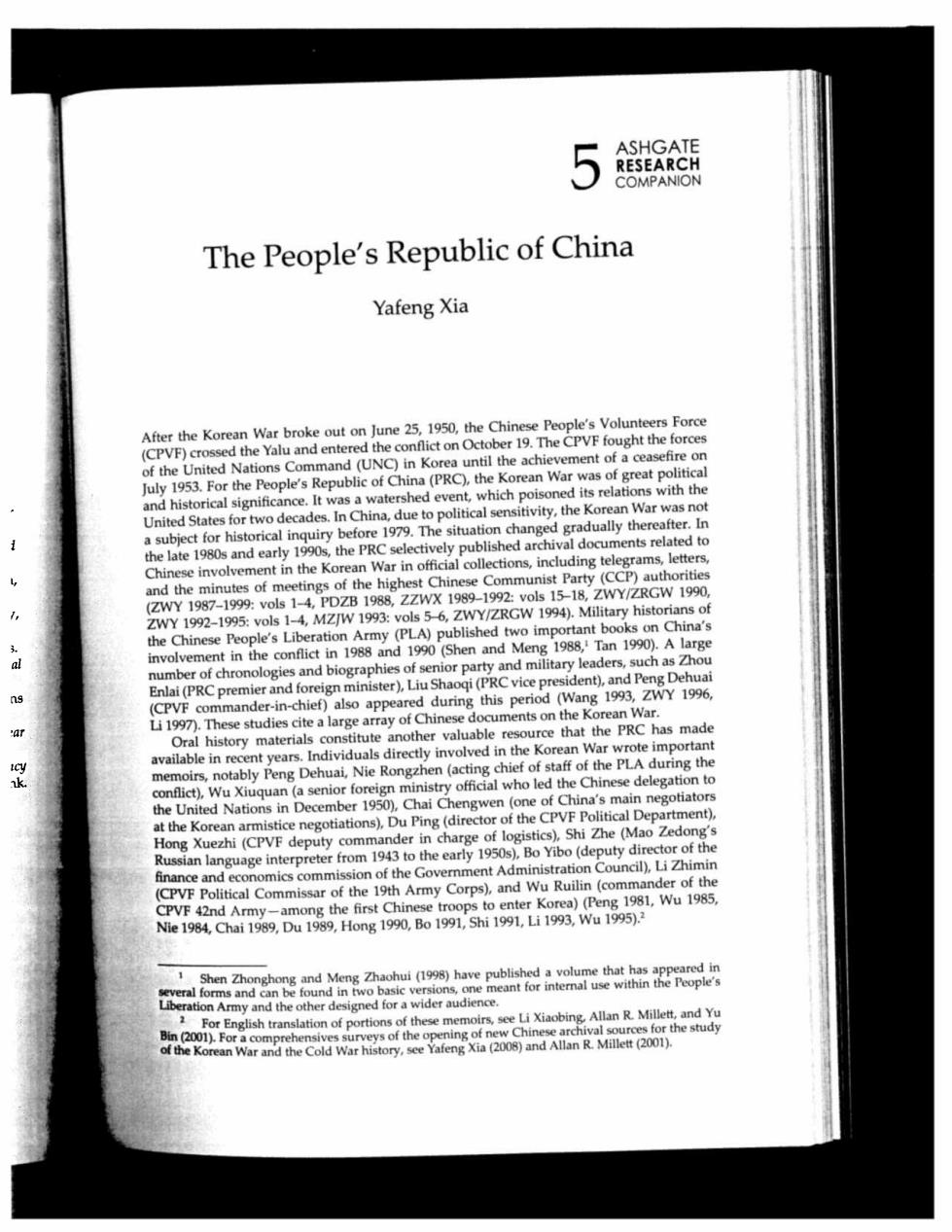正在加载图片...

5 ASHGATE RESEARCH COMPANION The People's Republic of China Yafeng Xia After the Korean War broke out on June 25,1950,the Chinese People's Volunteers Force (CPVF)crossed the Yalu and entered the conflict on October 19.The CPVF fought the forces of the United Nations Command(UNC)in Korea until the achievement of a ceasefire on July 1953.For the People's Republic of China(PRC),the Korean War was of great political and historical significance.It was a watershed event,which poisoned its relations with the United States for two decades.In China,due to political sensitivity,the Korean War was not a subject for historical inquiry before 1979.The situation changed gradually thereafter.In the late 1980s and early 1990s,the PRC selectively published archival documents related to Chinese involvement in the Korean War in official collections,including telegrams,letters, and the minutes of meetings of the highest Chinese Communist Party(CCP)authorities (☑WY1987-1999:vols1-4,PDZB1988,ZZWX1989-1992:vols15-18,ZWY/ZRGW1990, ZWY 1992-1995:vols 1-4,MZ/W 1993:vols 5-6,ZWY/ZRGW 1994).Military historians of the Chinese People's Liberation Army(PLA)published two important books on China's involvement in the conflict in 1988 and 1990 (Shen and Meng 1988,'Tan 1990).A large al number of chronologies and biographies of senior party and military leaders,such as Zhou Enlai(PRC premier and foreign minister),Liu Shaoqi(PRC vice president),and Peng Dehuai ns (CPVF commander-in-chief)also appeared during this period (Wang 1993,ZWY 1996, Li 1997).These studies cite a large array of Chinese documents on the Korean War. Oral history materials constitute another valuable resource that the PRC has made available in recent years.Individuals directly involved in the Korean War wrote important icy k memoirs,notably Peng Dehuai,Nie Rongzhen (acting chief of staff of the PLA during the conflict),Wu Xiuquan(a senior foreign ministry official who led the Chinese delegation to the United Nations in December 1950),Chai Chengwen (one of China's main negotiators at the Korean armistice negotiations),Du Ping(director of the CPVF Political Department), Hong Xuezhi(CPVF deputy commander in charge of logistics),Shi Zhe (Mao Zedong's Russian language interpreter from 1943 to the early 1950s).Bo Yibo(deputy director of the finance and economics commission of the Government Administration Council),Li Zhimin (CPVF Political Commissar of the 19th Army Corps),and Wu Ruilin(commander of the CPVE 42nd Army-among the first Chinese troops to enter Korea)(Peng 1981,Wu 1985, Nie1984,Chai1989,Du1989,Hong1990,Bo1991,Shi1991,i1993,Wu1995).2 Shen Zhonghong and Meng Zhaohui (1998)have published a volume that has appeared in several forms and can be found in two basic versions,one meant for internal use within the People's Liberation Army and the other designed for a wider audience. For English translation of portions of these memoirsLi Xiaobing Allan R Millett,and Yu Bin (2001).Fora comprehensives surveys of the opening of new Chinese archival sources for the study of the Korean War and the Cold War history,see Yafeng Xia (2008)and Allan R.Millett(2001)